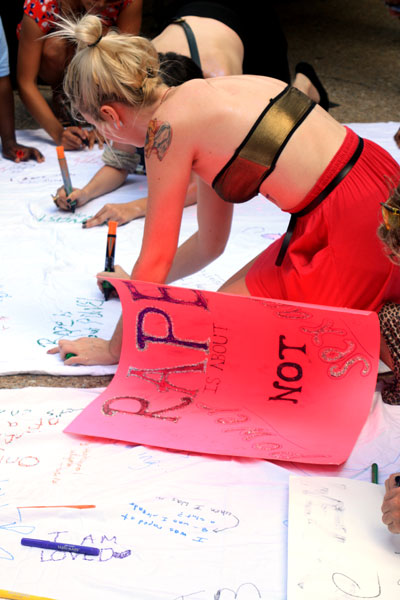
 |
| AUGUST THE FOURTEENTH -TWO THOUSAND ELEVEN |

 |
|
 |
ESSAY
 PHOTO: Nicole Wilson Participants of the Philadelphia Slut Walk prepare protest signs. Posted: 8/14/11 Slutwalk Philadelphia was not a grand event. I expected many more people to attend because over 11,00 RSVP’d on Facebook. Accounts say that more than 1,000 people showed up (1), but I would have estimated that there were less than 500 individuals there. The walk from Kahn Park at 11th and Pine, up to Market St and over to City Hall was short. Despite its lack of grandeur, the march and the rally still felt good. Parading through the streets, I felt like I was running a 5K; the sidewalk was lined with spectators who watched or shouted in solidarity or in awe. We got to City Hall to find that the stage had not yet been set up. After some finagling, the microphone gave off a tone and the speakers came onto the stage one by one. Slutwalks began in Toronto because on January 24, 2011, “a representative of the Toronto Police gave shocking insight into the Force’s view of sexual assault by stating, ‘women should avoid dressing like sluts in order not to be victimized’”(2) Organizers of the initial event, admittedly fed-up and tired (3) began to organize using this male conception to garner attention. Because of this, much and most critique of Slutwalks has been negative. Although the word “slut” reconnects back to the original event in Toronto, reviews have largely ignored that “slut” does nothing to convey the ideas at the core of the event. Some reviews bash porn and sex workers in protest of the event. (4) Other reviews see participants only as victims. (5) Stranger still, not a single review talks of how empowering it is to be standing amongst a group of individuals set to end the violence that has been hashed at them their entire lives. But the word “slut” is used solely as a buzzword and organizers at Slutwalk Philadelphia went so far as to make the claim that the popularity for the event was due solely to the controversy surrounding the word “slut”. It is unfortunate that the name of the event gets more press than the message behind the protest because the event itself is positive and beneficial for everyone involved. “When Dufourmantelle remarks that, according to Freud, ‘there’s no master without a hysteric to support him in his semblance of power and knowledge,’ AR [Avital Ronell] replies, ‘That’s exactly right. Women are the ones who, out of perversity and their often unanalyzed hysterical assaults, play against themselves, undoing their own legitimate bid for mastery… Because men detest passivity and mimeticism, they project their own lacks and weaknesses onto women, and women take these on with astonishing complicity.’” (9) PHOTOS: Nicole Wilson When I showed up for Slutwalk Philadelphia on Saturday, August 6, 2011, I immediately noticed a guy that I had “dated” when I first started undergrad holding a video camera filming the event. Women and men gathered in Kahn Park. I went to get coffee after we were told that the walk would begin thirty minutes after advertised. The New York Times Magazine recently published a controversial article about Slutwalks. Rebecca Traister rambles: “The most sophisticated attempts elicit just as much derision and, frankly, receive a fraction of the attention. All of which suggests that while clumsy stabs at righting sexual-power imbalances may be frustrating, they remain necessary. “Social progress is imperfect, full of half-truths and sloppy misrepresentations. After all, we celebrate the victories of a civil rights movement that was shot through with misogyny, and of a women’s movement riddled with racial, class and sexual resentments. Fighting for power is a complicated, messy process, especially for complicated, messy human beings. Often, the best we can hope for is that our efforts draw a spotlight.” (10) Slutwalk is something. It is some kind of organized feminist action. But that does not mean that it is the right kind of something. In the opening pages of A People’s History of the United States, Howard Zinn statesthat, “In the short run… the victims, themselves desperate and tainted with the culture that oppresses them, turn on other victims.” (11) Which brings me to Slutwalk Philadelphia, where, at the event, a member of the legal team said to the crowd of mostly white young women about the speakers coming onto the stage, “How did we do with diversity?” Statistically, the city of Philadelphia is a poor city and a Black city. In 2010, the U.S. Census concluded that in Philadelphia 36.9% individuals identify as “White” and “not Hispanic”. 43.4% of individuals identify as “Black”. 6.3% identify as “Asian” and 12.3% identify as “Hispanic or Latino in origin” (12). This does not account for the number of immigrants living in the Philadelphia metropolitan area, which in 2008 were at a number of about 500,000 (13). In 2009, the median income for a household in Philadelphia was $36,959 (14) whereas in Pennsylvania it was $49,501 (15) and nationally at $50,221 (16). 24.5% of the entire city’s population is below the poverty line (17), which is a number that in Pennsylvania alone 12.5% stand behind (18) and nationally 14.3% (19). I cannot help but question Slutwalk Philadelphia’s relevance for the 1.5 million people who were simply just not adequately represented on August 6, 2011. Brittany Cooper wrote for the blog, The Crunk Feminist Collective, “When I think of the daily assaults I hear in the form of copious incantations of ‘bitch’ and ‘ho’ in Hip Hop music directed at Black women, it’s hard to not feel a bit incensed at the ‘how-dare-you-quality’ of the SlutWalk protests, which feel very much like the protests of privileged white girls who still have an expectation that the world will treat them with dignity and respect.” (20) Knowing that I would be writing this essay about two months ago, I contacted Hannah Altman, Slutwalk Philadelphia’s organizer and attended the first two community meetings. The first Slutwalk meeting is in the musty basement of The Wooden Shoe. (You know, that anarchist bookstore on South Street with clean floors that sells books.) Hannah began the meeting by telling us that the City has been tugging her around and that the ACLU is now involved because demonstrating is a “right” protected by the Constitution. The City suits are pissed because they do not want Slutwalk in their streets; energy in the room ignites when word of the potential for a lawsuit arises. Hannah is a very young soft-spoken red head. She reads us an email from a handicapped woman upset that the venue was not handicapped accessible while admitting that she overlooked this detail for she has never organized anything like this before and she has no idea really what she is doing. A bit later, as the meeting draws to a close, it becomes apparent that there is no organization and that, Hannah, up until recently has just been trying to keep her head above water. We bring up issues like “community outreach” while the white-girl to black-girl ratio is 35:4. One woman suggests that we outreach to community organizations throughout the city by calling them, talking to them with our message, and asking their support. One of the members from the legal council looks up says that they have already called every organization with the words “women”, “abuse” or “violence” in their name throughout the entire state of Pennsylvania. The woman with the good responds quietly saying that is not the kind of community outreach that she was talking about. Nothing can be resolved until the city accepts Hannah’s new paperwork, which the suits have helped her file. As the meeting comes to an end, a black woman who has been sitting on the stairs speaks out. She says that she read about the meeting in the paper (It was advertised in Philadelphia Weekly earlier that day.) and that she was a victim of a brutal assault and rape two weeks ago. She believes in Slutwalk Philadelphia’s message and she supports what is being done whole-heartedly. Another woman, coincidentally white, interjects that we are all victims and that she was raped by her High School English teacher. And then we were measuring and comparing tragedy when I thought we were united in a common fight. Aura Blogando wrote on her blog, To the Curb, before she began writing for the Huffington Post about the lack of commentary being given about Slutwalks by women of color. She finishes her post by stating that, “Despite decades of work from women of color on the margins to assert an equitable space, SlutWalk has grown into an international movement that has effectively silenced the voices of women of color and re-centered the conversation to consist of a topic by, of, and for white women only.” (21) So, how do we move forward as the social tides of our country continue to shift if, as Lindsay German states, “there isn’t one unity of women but there are class divisions between women which are absolutely fundamental to how people organize” (22) Slutwalk Philadephia’s shortcomings are just more proof that Slutwalks are not the right answer to the problem at hand. Immediately following Slutwalk Philadelphia, I went home, took a shower, packed a bag and then hopped on a train to meet my mother. Our neighbor and my mother picked me up at the train station in a silver SUV. My mother had just had minor surgery and walking in an Air-cast. She made small talk and laughed normally. And what did I prove? 1. "Photos: Slutwalk." Aroundphilly.com. 8 August 2011. < http://www.aroundphilly.com/blog/2011/08/08/photos-slutwalk/> |
| ||||||||||||||||||||||||||